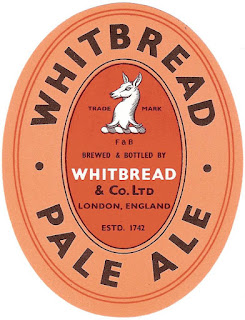Below PA in the strength hierarchy was the not very inspiringly named 2PA. Today, it would be about as strong as Bitter gets. Sadly, it wasn’t to be around for much longer. It was discontinued in 1916 and never reappeared.
It hadn’t been around all that long, only appearing in 1888, a good two decades after PA. It was brewed in far greater quantities, though: in 1909, 40,063 barrels to PA's 9,939 barrels. Making it far more likely for you to come across it down the pub.
Which has me wondering: was it a Stock Ale? Were I pushed, I’d go for it being semi-Stock, aged for maybe a couple of months after racking. The gravity just looks too high for it to be a running beer.
No need to mention anything about the recipe, it having been parti-gyled with the PA whose recipe I recently posted.
| 1909 Whitbread 2PA | ||
| pale malt | 8.75 lb | 79.55% |
| no. 1 sugar | 2.25 lb | 20.45% |
| Goldings 90 mins | 1.50 oz | |
| Goldings 60 mins | 1.50 oz | |
| Goldings 30 mins | 1.50 oz | |
| Goldings dry hops | 0.50 oz | |
| OG | 1054.5 | |
| FG | 1017 | |
| ABV | 4.96 | |
| Apparent attenuation | 68.81% | |
| IBU | 56 | |
| SRM | 7 | |
| Mash at | 151º F | |
| Sparge at | 165º F | |
| Boil time | 90 minutes | |
| pitching temp | 59º F | |
| Yeast | Wyeast 1099 Whitbread ale | |











































































1 comment:
Do you have any sense how this was shipped out to pubs if it was a semi-stock ale?
I have an easier time thinking about how a brewery might hang on to barrels that were fully aged, or ship out immediately a mild, than trying to figure out the quality control issues of a partially aged beer.
But I admit I'm awfully ignorant of how pub distribution worked then.
Post a Comment